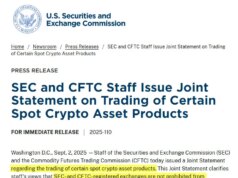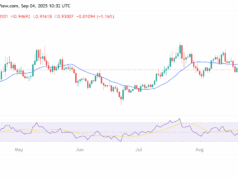Coinbase, one of the largest digital asset exchanges in the U.S., has filed a lawsuit against Oregon Governor Tina Kotek and Attorney General Dan Rayfield. The company is accusing the state of changing its digital asset policy in secret and not releasing public records to explain the decision.
The lawsuit, shared by Paul Grewal, Coinbase’s Chief Legal Officer on X, was filed in the Circuit Court of Marion County, Oregon, after the state sued Coinbase earlier this year, claiming the company sold unregistered digital assets to Oregon residents.

Coinbase says this sudden legal move goes against years of guidance from Oregon officials who had previously said bitcoin and other digital assets weren’t regulated as a security in the state.
In April, Oregon’s Attorney General filed a lawsuit against Coinbase, saying the company failed to register with the SEC or the Oregon Department of Consumer and Business Services.
This followed a similar lawsuit from the SEC in 2023 under the Biden administration, which was later dropped.
Related: Coinbase Faces New Lawsuit Alleging Sale of Unregistered Securities
Coinbase says Oregon’s decision to sue is a major and unexplained policy change.
The company says Oregon quietly reversed its long-held position that digital assets like bitcoin aren’t securities, without hearings, legislation, or public debate, adding, “this major shift in state policy occurred entirely behind closed doors.”
Coinbase is asking the court to force the release of documents that might explain why Oregon changed its policy and if any outside influences were involved.
Ryan VanGrack, Coinbase’s VP of Litigation, has been vocal about the company’s concerns. He says Oregonians have a right to know why their government changed policy so drastically without public input.
“Oregonians deserve to know why their government is keeping them in the dark — and why they’re pursuing a case that would deprive Oregonians (and only Oregonians) from trading crypto,” VanGrack said.
VanGrack also pointed out what he believes to be the financial motives behind the lawsuit. He says out-of-state law firms, particularly those in New York and DC, will make money if Oregon wins.
Coinbase says the policy change doesn’t just hurt the company — it hurts ordinary Oregonians who trade or hold digital assets. Without clear rules or public guidance, the lawsuit could create legal risks for residents who thought they were acting within the law.
In its filing, Coinbase said the state’s new stance could “wrongly criminalize everyday Oregonians.”
Grewal echoed this concern, saying Oregon’s actions are “meritless and politically driven”. He also slammed the state for reviving arguments that had already been dropped at the federal level.
“Oregon Gov. Tina Kotek, AG Dan Rayfield and other state officials flip flopped on digital assets behind closed doors, without hearings or agency rulemaking and public comment,” Grewal said. “And now they refuse the public records that show this.”
The Coinbase lawsuit comes at a time when federal lawmakers are moving towards clearer regulation of the digital asset industry. Two bipartisan bills — the CLARITY Act and the GENIUS Act — will be voted on in Congress soon.
The GENIUS Act (Guiding and Establishing National Innovation of U.S. Stablecoins) and the CLARITY Act aim to create national standards for digital assets. If passed, they could bring long-awaited clarity and consumer protection to the country.
Coinbase says Oregon’s lawsuit undercuts this progress.
“I can’t imagine a more illogical time for a state to insert itself when the federal government made it very clear it is their domain,” VanGrack said.





